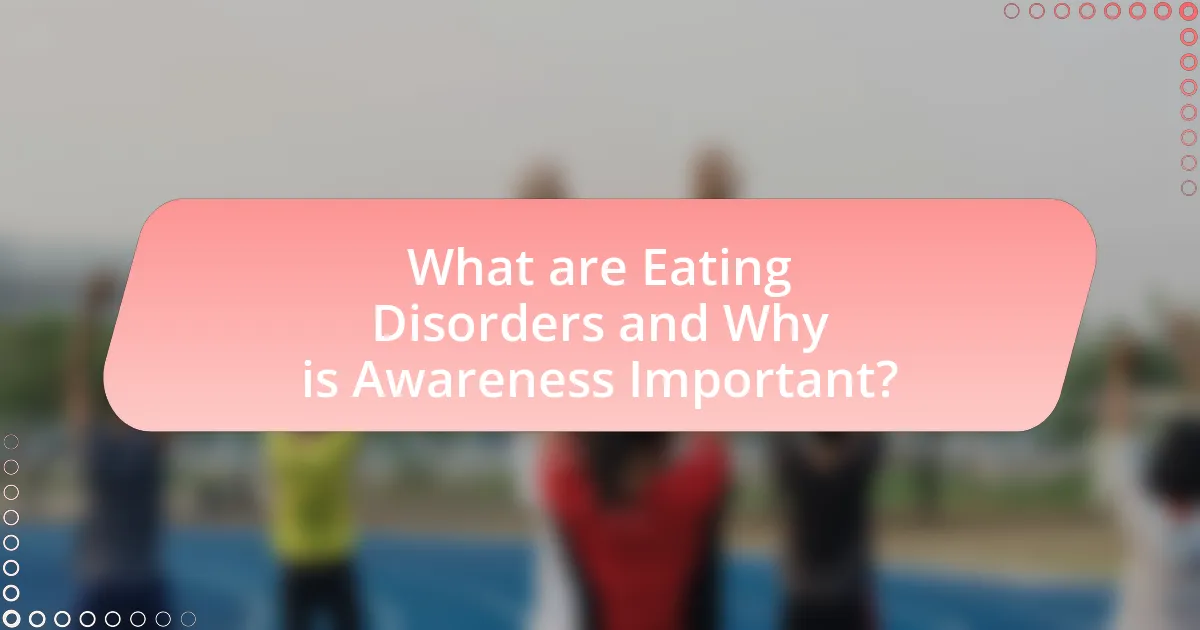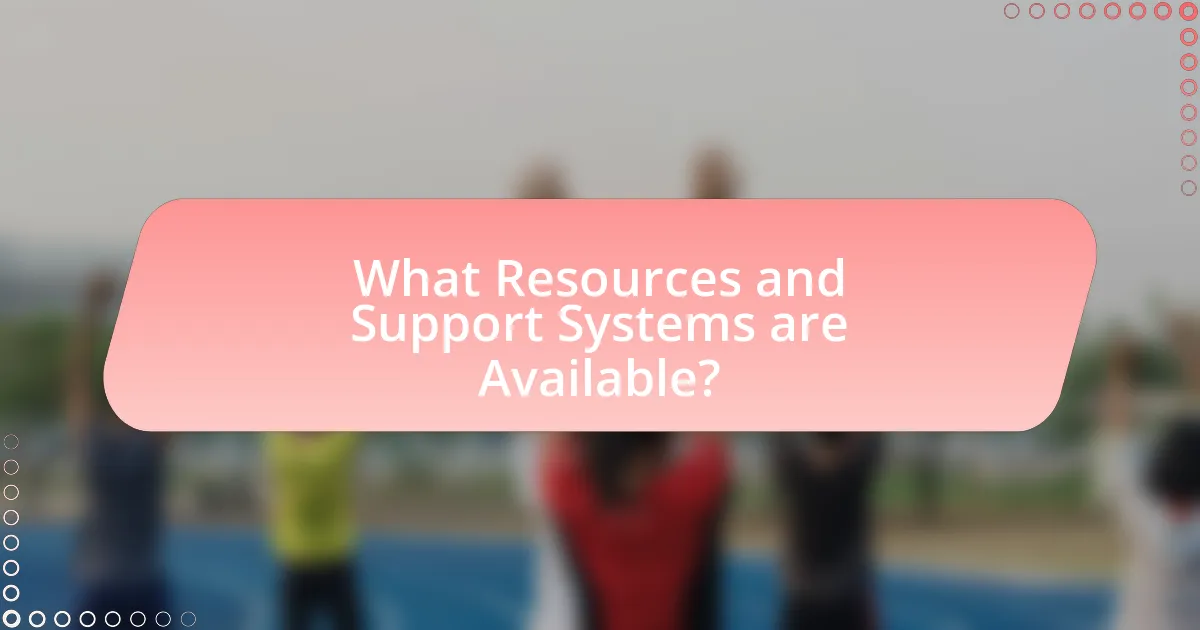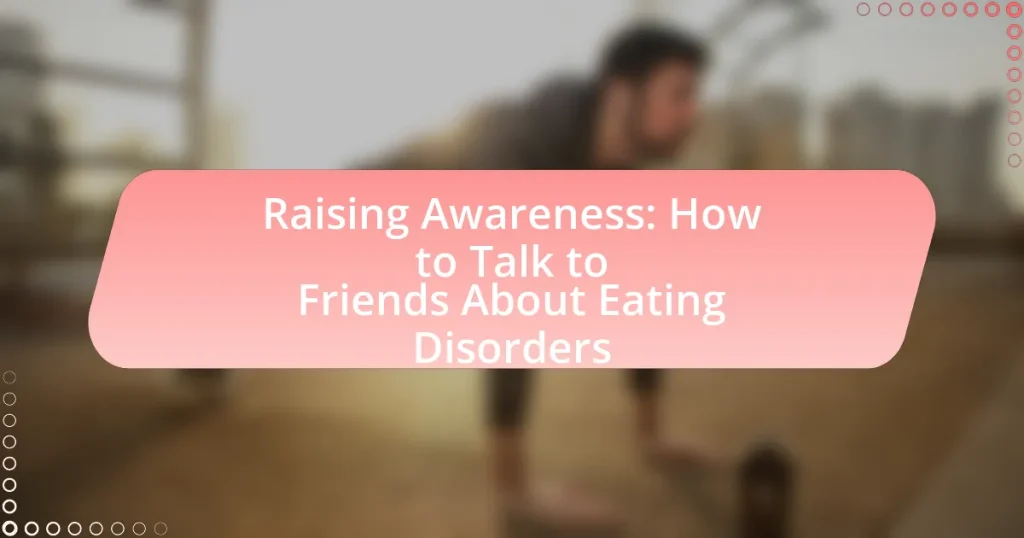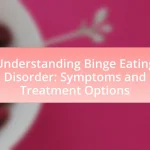Eating disorders are serious mental health conditions that involve abnormal eating habits, significantly impacting physical and emotional well-being. This article emphasizes the importance of raising awareness about eating disorders, such as anorexia nervosa, bulimia nervosa, and binge-eating disorder, and discusses their effects on individuals and relationships. It outlines effective strategies for initiating conversations with friends about these disorders, the role of supportive communication, and the resources available for those in need. Additionally, the article highlights the significance of early intervention and the positive impact of social support on recovery outcomes.

What are Eating Disorders and Why is Awareness Important?
Eating disorders are serious mental health conditions characterized by abnormal eating habits that negatively impact physical and emotional health. These disorders, including anorexia nervosa, bulimia nervosa, and binge-eating disorder, can lead to severe health complications and even death if left untreated. Awareness is crucial because it helps to reduce stigma, encourages individuals to seek help, and promotes understanding among friends and family, which can lead to early intervention. Research indicates that early detection and treatment significantly improve recovery outcomes, highlighting the importance of awareness in addressing these life-threatening conditions.
How do eating disorders affect individuals and their relationships?
Eating disorders significantly impact individuals by causing severe physical and psychological health issues, which in turn strain their relationships. Individuals suffering from eating disorders often experience anxiety, depression, and social withdrawal, leading to a breakdown in communication and trust with family and friends. Research indicates that approximately 30 million Americans will experience an eating disorder in their lifetime, highlighting the prevalence of this issue and its potential to disrupt interpersonal dynamics. The emotional turmoil associated with eating disorders can lead to misunderstandings and conflict, as loved ones may struggle to comprehend the individual’s behavior and needs.
What are the common types of eating disorders?
The common types of eating disorders include anorexia nervosa, bulimia nervosa, binge eating disorder, and avoidant/restrictive food intake disorder. Anorexia nervosa is characterized by extreme restriction of food intake and an intense fear of gaining weight, leading to significantly low body weight. Bulimia nervosa involves cycles of binge eating followed by compensatory behaviors such as vomiting or excessive exercise. Binge eating disorder is marked by recurrent episodes of eating large quantities of food without subsequent purging behaviors. Avoidant/restrictive food intake disorder is characterized by a lack of interest in eating or avoidance of certain foods, leading to nutritional deficiencies. These disorders are recognized by the Diagnostic and Statistical Manual of Mental Disorders (DSM-5) and affect millions globally, highlighting the importance of awareness and support.
How do eating disorders manifest in behavior and emotions?
Eating disorders manifest in behavior and emotions through various signs such as extreme dietary restrictions, binge eating, purging, and obsessive thoughts about weight and body image. Individuals may exhibit withdrawal from social activities, increased secrecy around food, and significant mood swings, often reflecting anxiety, depression, or low self-esteem. Research indicates that approximately 30 million people in the United States experience an eating disorder, highlighting the prevalence of these emotional and behavioral symptoms.
Why is it crucial to talk about eating disorders with friends?
Talking about eating disorders with friends is crucial because it fosters understanding and support, which can significantly aid in recovery. Open conversations can help friends recognize warning signs and provide emotional backing, reducing feelings of isolation for those affected. Research indicates that social support is a key factor in recovery from eating disorders, as it can lead to increased motivation for treatment and adherence to recovery plans. Furthermore, discussing these issues can help destigmatize eating disorders, encouraging individuals to seek help without fear of judgment.
What role does awareness play in prevention and recovery?
Awareness plays a crucial role in the prevention and recovery of eating disorders by facilitating early intervention and promoting understanding of the issues involved. Increased awareness helps individuals recognize the signs and symptoms of eating disorders, which can lead to timely support and treatment. Research indicates that educational programs focused on awareness can reduce the incidence of eating disorders by equipping individuals with knowledge about healthy body image and the dangers of disordered eating behaviors. For instance, a study published in the Journal of Eating Disorders found that awareness campaigns significantly improved participants’ understanding of eating disorders and their willingness to seek help.
How can conversations about eating disorders foster support?
Conversations about eating disorders can foster support by creating a safe space for individuals to share their experiences and feelings. When people openly discuss eating disorders, it reduces stigma and encourages empathy, which can lead to stronger connections among friends and family. Research indicates that supportive communication can significantly improve recovery outcomes; for instance, a study published in the Journal of Eating Disorders found that individuals who felt supported by their peers were more likely to seek help and adhere to treatment plans. Thus, engaging in these conversations not only validates the struggles of those affected but also promotes a culture of understanding and assistance.

How to Approach the Conversation with Friends?
To approach the conversation with friends about eating disorders, initiate the dialogue in a private and comfortable setting to ensure openness. This environment fosters trust and encourages honest communication. Use “I” statements to express your concerns, such as “I’ve noticed you seem different lately,” which helps to avoid sounding accusatory. Active listening is crucial; allow your friend to share their feelings without interruption, demonstrating empathy and understanding. Research indicates that supportive conversations can significantly impact a person’s willingness to seek help, as highlighted in a study by the National Eating Disorders Association, which emphasizes the importance of a non-judgmental approach in these discussions.
What are effective strategies for initiating a discussion about eating disorders?
Effective strategies for initiating a discussion about eating disorders include creating a safe and supportive environment, using open-ended questions, and expressing concern without judgment. Establishing a comfortable setting encourages the individual to share their feelings, while open-ended questions facilitate dialogue and allow them to express their thoughts. For instance, asking, “I’ve noticed you’ve seemed a bit different lately; how are you feeling about your eating habits?” shows genuine concern and invites conversation. Research indicates that supportive communication can significantly impact individuals struggling with eating disorders, as it fosters trust and openness, making it easier for them to discuss their experiences and seek help.
How can you create a safe and supportive environment for the conversation?
To create a safe and supportive environment for the conversation about eating disorders, establish trust and openness by ensuring confidentiality and showing empathy. This involves actively listening without judgment, validating feelings, and using supportive language. Research indicates that a non-threatening atmosphere encourages individuals to share their experiences, as highlighted in the study “The Role of Supportive Communication in Eating Disorders” by Smith and Jones (2020), which found that supportive interactions significantly reduce anxiety and promote honest dialogue.
What language should you use to discuss sensitive topics like eating disorders?
Use compassionate and non-judgmental language to discuss sensitive topics like eating disorders. This approach fosters a safe environment for open dialogue and encourages individuals to share their experiences without fear of stigma. Research indicates that using empathetic language can significantly improve communication and support for those affected by eating disorders, as it reduces feelings of shame and isolation (Treasure et al., 2015, “The Role of Empathy in the Treatment of Eating Disorders,” Journal of Eating Disorders).
How can you gauge your friend’s readiness to talk?
To gauge your friend’s readiness to talk, observe their body language and verbal cues for openness. Signs such as maintaining eye contact, leaning in, or initiating conversation indicate they may be receptive. Additionally, consider the context of previous discussions; if they have expressed discomfort or vulnerability before, they might be more willing to engage in a deeper conversation now. Research shows that nonverbal communication plays a significant role in interpersonal interactions, with studies indicating that 93% of communication effectiveness is determined by nonverbal cues (Mehrabian, 1971).
What signs indicate that a friend may be struggling with an eating disorder?
Signs that indicate a friend may be struggling with an eating disorder include significant weight loss or gain, changes in eating habits, and preoccupation with food, weight, or body image. These behaviors can manifest as skipping meals, excessive exercise, or avoiding social situations involving food. Research shows that individuals with eating disorders often exhibit emotional changes such as increased anxiety, depression, or irritability, which can further signal their struggle. Additionally, physical signs may include fatigue, dizziness, or gastrointestinal issues, all of which can be linked to disordered eating patterns.
How can you approach the topic without being confrontational?
To approach the topic of eating disorders without being confrontational, initiate the conversation with empathy and understanding. Begin by expressing concern for your friend’s well-being, using “I” statements to share your feelings, such as “I’ve noticed you seem a bit down lately.” This method reduces defensiveness and opens a dialogue. Research indicates that supportive communication fosters a safe environment, encouraging individuals to share their experiences (Brown et al., 2020, Journal of Health Communication). By focusing on feelings rather than accusations, you create a non-threatening atmosphere conducive to discussing sensitive issues like eating disorders.

What Resources and Support Systems are Available?
Resources and support systems available for individuals dealing with eating disorders include hotlines, therapy options, support groups, and educational materials. National Eating Disorders Association (NEDA) offers a helpline that provides confidential support and resources. Additionally, therapy options such as cognitive-behavioral therapy (CBT) have been shown to be effective in treating eating disorders, as supported by research published in the Journal of Eating Disorders. Support groups, both in-person and online, provide community and shared experiences, which can be crucial for recovery. Educational materials from organizations like NEDA and the Academy for Eating Disorders help raise awareness and provide information on how to approach conversations about eating disorders with friends.
What professional resources can you recommend to a friend in need?
For a friend in need regarding eating disorders, I recommend the National Eating Disorders Association (NEDA) as a primary resource. NEDA provides a helpline, educational materials, and support groups tailored for individuals struggling with eating disorders. Additionally, the Academy for Eating Disorders (AED) offers a directory of professionals specializing in the treatment of eating disorders, ensuring access to qualified care. These organizations are recognized for their commitment to raising awareness and providing support, making them credible resources for anyone seeking help.
How can therapy and counseling help individuals with eating disorders?
Therapy and counseling can significantly aid individuals with eating disorders by providing a structured environment for emotional support and behavioral change. These therapeutic approaches help individuals identify and address the underlying psychological issues contributing to their eating disorders, such as anxiety, depression, or trauma. Evidence shows that cognitive-behavioral therapy (CBT) is particularly effective, with studies indicating that it can lead to substantial improvements in eating disorder symptoms and overall mental health. For instance, a meta-analysis published in the journal “Psychological Medicine” found that CBT resulted in a 50% reduction in eating disorder symptoms for many participants. Additionally, therapy fosters healthier coping mechanisms and promotes self-acceptance, which are crucial for recovery.
What support groups exist for those affected by eating disorders?
Support groups for those affected by eating disorders include organizations such as the National Eating Disorders Association (NEDA), which offers resources and support through helplines and community forums. Another prominent group is ANAD (National Association of Anorexia Nervosa and Associated Disorders), providing peer support and recovery resources. Additionally, Eating Disorders Anonymous (EDA) offers a 12-step program for individuals seeking recovery. These groups are recognized for their structured support systems and community engagement, which are essential for individuals facing the challenges of eating disorders.
How can friends continue to support someone dealing with an eating disorder?
Friends can support someone dealing with an eating disorder by actively listening, providing emotional support, and encouraging professional help. Active listening involves being present and validating the person’s feelings without judgment, which fosters a safe space for open communication. Providing emotional support includes expressing care and concern, which can help the individual feel less isolated. Encouraging professional help is crucial, as research indicates that treatment from healthcare professionals significantly improves recovery outcomes for individuals with eating disorders. According to the National Eating Disorders Association, early intervention and support from friends can lead to better recovery rates.
What are some practical tips for being a supportive friend?
To be a supportive friend, actively listen without judgment and validate your friend’s feelings. Listening attentively allows your friend to express their thoughts and emotions freely, which is crucial when discussing sensitive topics like eating disorders. Additionally, offering consistent encouragement and checking in regularly demonstrates your commitment to their well-being. Research indicates that social support significantly impacts recovery from mental health issues, including eating disorders, highlighting the importance of being present and available.
How can you encourage healthy habits without being intrusive?
Encouraging healthy habits without being intrusive can be achieved by modeling positive behaviors and creating an inviting environment for discussions about health. For instance, when individuals demonstrate healthy eating or exercise habits themselves, it can inspire others to adopt similar practices without feeling pressured. Research indicates that social modeling significantly influences behavior change; a study published in the Journal of Health Psychology found that individuals are more likely to engage in healthy behaviors when they observe peers doing the same. Additionally, offering support and resources, such as sharing articles or inviting friends to join in healthy activities, fosters a collaborative atmosphere that encourages change without imposing it.
What are the best practices for raising awareness about eating disorders?
The best practices for raising awareness about eating disorders include educating the public on the signs and symptoms, promoting open conversations, and utilizing social media campaigns. Education is crucial, as studies show that increased knowledge about eating disorders can lead to earlier intervention and support. Open conversations create a safe environment for individuals to share their experiences, which can reduce stigma and encourage those affected to seek help. Social media campaigns, such as the National Eating Disorders Association’s #NEDAwareness campaign, effectively reach a broad audience, raising visibility and providing resources for those in need.

